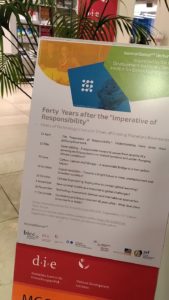 In 1979, the book „Imperative of Responsibility: In Search of an Ethics for the Technological Age“ by the Jewish philosopher Hans Jonas was first published. The work reflects the increasing unease since the seventies about environmental destruction and technological developments with hardly calculable risks for mankind. First to be mentioned is the threat posed by the nuclear arms race. Jonas also discusses other ethical aspects of technological developments, such as eugenics. Hans Jonas took a clear position and strongly recommended to strictly reject technologies with potentially global and not yet fully understood consequences. Since 1979, the world population has increased by 3 billion people. Even without technology-induced catastrophes, planetary boundaries have been reached and in some cases already transgressed. Today, as forty years ago, the „ecological imperative“ formulated in the „Imperative of Responsibility“ is undisputed: „Act so that the effects of your action are compatible with the permanence of genuine human life“.
In 1979, the book „Imperative of Responsibility: In Search of an Ethics for the Technological Age“ by the Jewish philosopher Hans Jonas was first published. The work reflects the increasing unease since the seventies about environmental destruction and technological developments with hardly calculable risks for mankind. First to be mentioned is the threat posed by the nuclear arms race. Jonas also discusses other ethical aspects of technological developments, such as eugenics. Hans Jonas took a clear position and strongly recommended to strictly reject technologies with potentially global and not yet fully understood consequences. Since 1979, the world population has increased by 3 billion people. Even without technology-induced catastrophes, planetary boundaries have been reached and in some cases already transgressed. Today, as forty years ago, the „ecological imperative“ formulated in the „Imperative of Responsibility“ is undisputed: „Act so that the effects of your action are compatible with the permanence of genuine human life“.
Since April 2019, a series of events has focused on the ethical aspects of technology choice. The event series therefore focused on the question of whether the policy implications of the ecological imperative need to be formulated differently today than forty years ago. Experts discussed this, using gene editing (CRISPR CAS), carbon capture and storage (CCS) and climate engineering as examples. Many scientists assign great potential to these technologies for mitigating climate change or dealing better with its consequences. However, German society and politics strongly reject these technologies.
At the closing event on December 11, Imme Scholz, acting Director at the German Development Institute / Deutsches Institut für Entwicklungspolitik (DIE) and Jakob Rhyner, Scientific Director of the Bonn Alliance for Sustainability Research discussed some of the issues raised in recent months. These were formulated by Andreas Stamm (DIE) on the basis of the six previous panel events. They discussed that responsible action today can also mean preparing technologies for safe application through research and development if they can be expected to make a significant contribution to meeting global challenges. New technologies cannot replace a more comprehensive sustainability transformation, they can only accompany it. Moreover, only technologies whose effects are fundamentally reversible can be considered for potential application.
The Bonn Alliance for Sustainability Research / Innovation Campus Bonn (ICB) is funded by the Ministry of Culture and Science of the German State of North Rhine-Westphalia.

Schreibe einen Kommentar